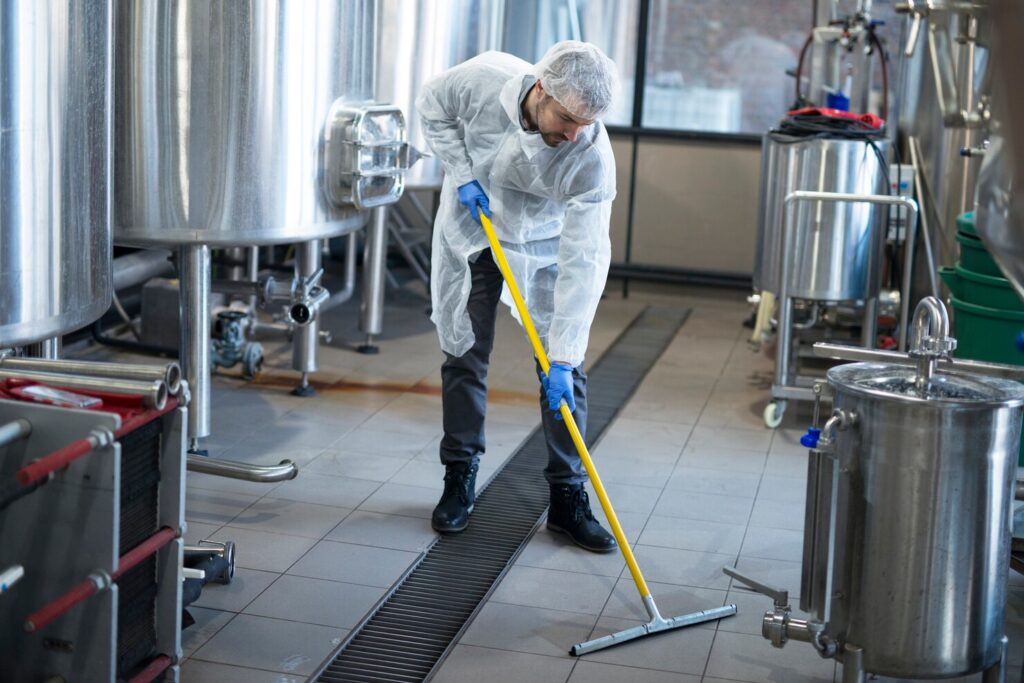A clean commercial kitchen is essential for food safety, employee morale, and the overall success of your business. However, with the demands of a busy kitchen, it can be difficult to maintain the highest standards of cleanliness on your own. This is where professional commercial kitchen cleaning services come in.
Professional commercial kitchen cleaning services providers have the expertise and equipment to deep clean every inch of your kitchen, from the floors and walls to the ceilings and ventilation systems. They also use food-safe cleaning products and disinfectants to ensure that your kitchen is completely sanitized.
What is professional commercial kitchen cleaning?

Professional commercial kitchen cleaning is a specialized service provided by professional cleaning companies to ensure that commercial kitchen exhaust cleaning in restaurants, hotels, catering facilities, and other food service establishments is maintained in a safe, hygienic, and compliant condition.
Professional commercial kitchen deep cleaning services often use specialized equipment and cleaning agents designed for the unique challenges of commercial kitchens. They are also typically familiar with commercial kitchen cleaning regulations and health codes, ensuring that the kitchen remains in compliance with health and safety standards.
Why is professional commercial kitchen cleaning important?
Professional kitchen cleaning is important for several reasons:
Health and Safety: A clean kitchen is essential for preventing foodborne illnesses and ensuring the safety of both customers and staff. Bacteria, pathogens, and allergens can accumulate in a dirty kitchen, leading to potential health risks.
Compliance with Regulations: Health departments and other regulatory bodies often have strict cleanliness and sanitation requirements for commercial kitchens. Failure to meet these standards can result in fines, closure of the establishment, or even legal consequences.
Fire Prevention: Grease buildup in kitchens, particularly in exhaust hoods and ventilation systems, can be a significant fire hazard. Regular cleaning of these areas is essential for fire prevention.
Extended Equipment Life: Regular cleaning of kitchen equipment helps prevent the buildup of grease, grime, and other residues that can lead to equipment malfunctions or breakdowns. This can save money on costly repairs or replacements.
Improved Food Quality: A clean kitchen is more likely to produce high-quality, safe, and consistent food. Contaminated surfaces or equipment can lead to off-flavors or tainted food.
Customer Satisfaction: A clean and well-maintained kitchen reflects positively on the overall image of a restaurant or food service establishment. Customers are more likely to return and recommend a place that is clean and hygienic.
Employee Morale and Productivity: A clean and organized kitchen provides a better working environment for staff. It can boost morale, increase productivity, and reduce the risk of accidents or injuries.
Pest Control: Leftover food debris and unclean areas can attract pests like rodents, insects, and vermin. Regular cleaning helps prevent infestations and the associated problems they bring.
Odor Control: Accumulated food residues and grease can lead to unpleasant odors in the kitchen. Regular cleaning helps eliminate these odors, creating a more pleasant dining experience for customers.
Environmental Responsibility: Proper disposal of waste and the use of eco-friendly commercial kitchen hood cleaning products is important for minimizing the environmental impact of a commercial kitchen.
Liability Reduction: In the event of a foodborne illness outbreak or other health-related incident, demonstrating that the kitchen was regularly cleaned and maintained according to industry standards can help reduce legal liability.
Benefits of professional commercial kitchen cleaning

Maintained Health and Safety Standards:
Regular, thorough cleaning in a commercial kitchen is crucial for maintaining high health and safety standards. Foodborne illnesses and contamination can result from unclean surfaces and equipment. By ensuring that all areas are sanitized and free from harmful pathogens, professional cleaning helps create a safe environment for food preparation and service.
Compliance with Regulations:
Health departments and regulatory agencies have strict cleanliness and sanitation requirements for commercial kitchens. Professional kitchen cleaning services are well-versed in these standards and can ensure that the establishment meets or exceeds them. This compliance helps avoid fines, penalties, and potential legal issues, allowing the business to operate without interruptions.
Extended Equipment Life:
Kitchen equipment can be a significant investment, and regular cleaning is essential for prolonging their lifespan. Accumulated grease, dirt, and food residues can lead to equipment malfunctions or breakdowns. Restaurant kitchen hood cleaning services use specialized techniques and products to remove these residues, reducing the need for costly repairs or replacements.
Improved Food Quality:
The cleanliness of a kitchen directly impacts the quality and safety of the food prepared. A clean environment minimizes the risk of cross-contamination, ensuring that the food remains safe and free from contaminants. Additionally, a clean kitchen helps maintain the natural flavors and quality of ingredients, resulting in better-tasting dishes for customers.
Enhanced Image and Customer Satisfaction:
A clean kitchen reflects positively on the overall image of the food service establishment. It conveys a commitment to cleanliness, hygiene, and quality. Customers are more likely to have confidence in an establishment that maintains a clean environment. This positive impression can lead to increased customer satisfaction, repeat business, and positive word-of-mouth recommendations.
Professional Commercial Kitchen Cleaning Checklists

Here’s the commercial kitchen cleaning checklist broken down:
Daily Cleaning Tasks:
Preparation Surfaces:
Daily cleaning of preparation surfaces is essential to maintain hygiene. This involves wiping down and sanitizing countertops, cutting boards, and prep tables. It ensures that any potential cross-contamination is minimized, creating a safe environment for food preparation.
Cooking Equipment:
Cleaning cooking equipment on a daily basis is crucial for preventing the buildup of grease and food residues. This includes stovetops, ovens, grills, fryers, and ranges. Additionally, emptying and cleaning grease traps is important to prevent blockages and maintain proper drainage.
Dishwashing Area:
The dishwashing area should be cleaned and sanitized daily to ensure that dishes and utensils are thoroughly cleaned and safe for use. This involves cleaning sinks, faucets, and dish racks. It’s also important to empty and clean the dish machine to prevent the buildup of food particles.
Exhaust Hoods and Vents:
Daily cleaning of exhaust hoods, filters, and vents is essential for fire prevention. Grease buildup in these areas can be a significant fire hazard. Additionally, ensuring the exhaust fan is functioning properly helps maintain proper ventilation in the kitchen.
Flooring:
Daily sweeping and mopping of all floors is necessary to prevent slips, trips, and falls. Paying special attention to areas prone to spills and grease buildup is crucial for maintaining a safe working environment. It’s also important to clean floor drains to prevent any blockages.
Weekly Cleaning Tasks:
Refrigeration Units:
Weekly cleaning and organization of refrigerators and freezers is important to prevent the buildup of food residues and maintain proper food storage conditions. This includes emptying and cleaning the interior surfaces, as well as wiping down shelving.
Storage Areas:
Weekly cleaning and organization of shelves and storage areas help prevent clutter and ensure that food items are stored properly. This includes checking for any expired or spoiled items that need to be removed.
Waste Disposal:
Weekly emptying and sanitizing of trash cans, recycling bins, and compost containers is crucial for maintaining a clean and odor-free environment. Proper disposal of waste according to local regulations should be followed.
Walls and Ceilings:
Weekly wiping down and sanitizing of wall surfaces, especially near cooking areas, helps prevent the buildup of grease and dirt. Regular inspection for any signs of grease buildup or damage is important for maintaining a clean and safe kitchen environment.
Pest Control:
Regular inspection for signs of pests and taking appropriate measures for prevention is important to ensure a pest-free environment. This includes sealing any potential entry points and maintaining a clean and sanitary kitchen.
These tasks, when performed consistently, contribute to a clean, safe, and efficient commercial kitchen environment.
How to choose a professional commercial kitchen cleaning services provider:
Choosing a professional commercial kitchen cleaning services provider is an important decision that can significantly impact the cleanliness, safety, and compliance of your food service establishment. Here are steps to help you make an informed choice:
Check for Proper Certification and Licensing:
Ensure that the cleaning company is licensed and certified to provide commercial kitchen cleaning services. This demonstrates that they have met industry standards and have the necessary expertise to handle the unique challenges of commercial kitchen cleaning.
Verify Experience and Expertise:
Look for a provider with a proven track record in commercial kitchen cleaning. Experience in this specific field means they understand the complexities of kitchen cleaning, including specialized equipment and surfaces.
Ask for References and Reviews:
Request references from previous clients or read online reviews. This will give you insights into the provider’s reputation, reliability, and the quality of their services.
Inquire About Cleaning Methods and Products:
Ask about the cleaning methods, tools, and commercial kitchen cleaning products the company uses. They should use industry-standard cleaning agents and equipment that are safe for food preparation areas.
Check for Insurance and Liability Coverage:
Ensure the cleaning service provider is adequately insured. This protects your business in case of any accidents or damages that may occur during the cleaning process.
Review Compliance with Health and Safety Regulations:
Confirm that the cleaning company is aware of and adheres to relevant health and safety regulations specific to commercial kitchens. They should be well-versed in local health codes and industry standards.
Discuss Customized Cleaning Plans:
A reputable provider will be willing to create a customized cleaning plan tailored to the specific needs and layout of your commercial kitchen. This ensures that all critical areas are covered and maintained appropriately.
Ask About Availability and Flexibility:
Determine if the cleaning company can accommodate your schedule, especially if you have specific time frames or downtime periods for cleaning. Flexibility in scheduling is important for minimizing disruption to your operations.
Evaluate Communication and Responsiveness:
Effective communication is key. Ensure the provider is responsive to inquiries, addresses concerns promptly, and maintains clear lines of communication throughout the cleaning process.
Discuss Pricing and Contracts:
Obtain detailed pricing information and inquire about the terms of the contract. Be wary of any hidden fees or unclear terms. Make sure you understand the scope of services included in the price.
Visit Completed Projects (Optional):
If possible, visit establishments where the cleaning company has provided services. This can give you a firsthand look at the quality of their work and the level of cleanliness they maintain.
In the quest for a professional commercial kitchen cleaning services provider, Atmax Air Filtration emerges as a trusted choice. Their reputation for reliability and experience sets them apart, ensuring a clean and safe kitchen environment.
Conclusion
In conclusion, a professional commercial kitchen cleaning schedule is an essential part of any food service business. A clean and sanitary kitchen is essential for food safety, employee morale, and customer satisfaction. By hiring a professional commercial kitchen cleaning company, you can ensure that your kitchen is cleaned to the highest standards, using food-safe cleaning products and disinfectants.
Professional commercial kitchen cleaners have the expertise and equipment to deep clean every inch of your kitchen, from the floors and walls to the ceilings and ventilation systems. They also know how to identify and remove potential hazards, such as food residue, grease, and grime.
If you are serious about food safety and the success of your business, then professional commercial kitchen cleaning is a must-have. Contact a professional commercial kitchen cleaning company today to learn more about their services and how they can help you to keep your kitchen clean, safe, and sanitary.

